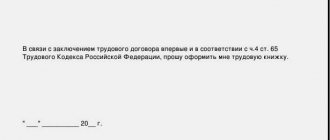Determination of labor discipline according to the Labor Code of the Russian Federation
Labor discipline, according to Art. 189 of the Labor Code of the Russian Federation, it is the employee’s obligation to obey the rules of conduct in force for a particular employer. In particular, they include the rules established by:
- Labor Code related to the basic rights and obligations of the parties to the employment contract;
- internal acts defining general internal labor regulations;
- a collective agreement regulating a number of issues of interaction between the administration and the staff;
- job descriptions defining the range of functions of employees occupying certain positions;
- instructions on other issues reflecting the rules of conduct in the workplace;
- employment contracts individually concluded with each employee.
The set of these rules determines labor discipline, which has both aspects common to all workers and those related specifically to individual individuals.
Violation of labor discipline is fraught with disciplinary action for the employee. According to Art. 192 of the Labor Code of the Russian Federation, it can be applied if, through the fault of the employee, official (labor) duties were not fulfilled by him or were performed improperly. That is, consequences in the form of punishment may occur for an employee for an offense related not only to his violation of labor legislation or regulations established by the employer, but also in connection with the improper performance of his main labor functions. Moreover, due to the unique set of responsibilities for certain positions, the approach to determining the existence of a disciplinary offense is individual. And it may happen that an event that is considered a violation for one employee will not be such for another.
Examples of violations of labor discipline can be:
- long unmotivated absence from the workplace;
- unreasonable refusal to undergo mandatory inspections or instructions, without which permission to work is impossible;
- unjustified refusal to conclude an agreement on full financial liability if the employee’s position obliges him to draw up this agreement.
What depends on the employer
Labor legislation also establishes obligations for employers to create conditions for compliance with discipline:
- provide employees with work stipulated by the employment contract;
- provide them with equipment, tools, technical documentation and other means necessary to perform their duties;
- ensure safety, security and occupational health;
- pay employees wages in full and on time, etc.
If these conditions are not met, the employee’s violation of the rules of conduct is not considered his fault (for example, if conditions were not created for him to undergo labor safety training).
Types of penalties for violation of discipline by an employee
As punishment for disciplinary violations, the following types of influence can be applied to an employee (Article 192 of the Labor Code of the Russian Federation):
- comment;
- rebuke;
- dismissal.
These penalties are acceptable for use by any employer. But other types can also be used if they are provided for by law for a certain category of workers.
NOTE! A monetary fine cannot be used as a disciplinary sanction. For this, the employer himself may receive a fine from the labor inspectorate. And if the fined person goes to court, the employer will be obliged to reimburse him for what was withheld and to pay interest for the delay under Art. 236 of the Labor Code of the Russian Federation, and possibly compensation for moral damage. Whether it is possible to deprive employees of bonuses for misconduct, find out here.
For one offense there can be only one punishment (Article 193 of the Labor Code of the Russian Federation). But if the violation is not stopped by punishment (continues to last), if it is periodically repeated or a new type of offense is committed, then the penalty will be applied to these violations again. That is, one employee may receive several punishments over a period of time.
If, as a result of a disciplinary offense committed by an employee, the employer suffers material damage, then he has the right to apply double liability to the violator (Article 248 of the Labor Code of the Russian Federation): both disciplinary and material.
When an employee’s misconduct does not entail serious consequences, the punishment has an educational purpose and is expressed in the form of a remark or reprimand. Dismissal is resorted to as a last resort in cases of gross violations of discipline.
What else do you need to remember?
The application of punishments for violation of labor discipline to the offending employee is carried out in strict accordance with current legislation. Each enterprise must develop rules regulating the internal procedures of the company. They describe the fundamental aspects of the work process. Employees must be familiar with them by signature.
Employees bear full responsibility for violation of labor discipline. By signing an agreement at the beginning of cooperation, they agree to the requirements and responsibilities established for them. If a fact of non-compliance with agreements (terms of the contract or internal rules of the company) is detected, a report is drawn up
A thorough study of the circumstances of the current situation is mandatory. In some cases, an employee is forced to violate established requirements in order to avoid more serious consequences for the company. It is for this reason that management needs to take every recorded fact seriously. Proper organization of work, including a system of “reward-punishment”, will reduce possible conflicts in the process and help increase employee productivity, and, accordingly, company profit.
Video - “Introductory training on labor protection”
Internal regulations are approved at each enterprise. This document is considered a kind of instruction for employees, which spells out all the features of the work procedure - from the number of working hours to the procedure for calculating bonuses or disciplinary sanctions. Employees often violate these rules. What are the consequences of non-compliance with labor regulations for employees and are the employer’s actions legal in cases where violations are recorded?
A special type of penalty is dismissal
Gross misconduct for which dismissal is permissible includes:
- repeatedly committed violations of a disciplinary nature (clause 5 of Article 81 of the Labor Code of the Russian Federation).
- absenteeism, which is considered absence from the workplace for more than 4 hours in a row or the entire shift (subparagraph “a”, paragraph 6, article 81 of the Labor Code of the Russian Federation);
- appearing at work under the influence of intoxicants (subparagraph “b”, paragraph 6, article 81 of the Labor Code of the Russian Federation);
- disclosure of information related to secrets of any level: from state to personal (subclause “c” of paragraph 6 of Article 81 of the Labor Code of the Russian Federation);
- causing harm to someone else's property, if this fact is established by law (subparagraph “d”, paragraph 6 of Article 81 of the Labor Code of the Russian Federation);
- the occurrence of severe consequences for people and property or the creation of a high probability of their occurrence as a result of the employee’s violation of labor protection requirements (subparagraph “d”, paragraph 6 of Article 81 of the Labor Code of the Russian Federation);
- the commission by a financially responsible person of actions that cast doubt on the issue of trust in him (clause 7 of Article 81 of the Labor Code of the Russian Federation);
- concealment by an employee holding a position that presupposes the openness of information about his financial situation, data on property belonging to his family (clause 7.1 of Article 81 of the Labor Code of the Russian Federation);
- commission of an immoral act by a teacher (clause 8 of Article 81 of the Labor Code of the Russian Federation);
- adoption by the head of a legal entity of a decision that led to material damage for this legal entity (clause 9 of Article 81 of the Labor Code of the Russian Federation);
- gross violation of his direct labor duties by the head of a legal entity (clause 10 of article 81 of the Labor Code of the Russian Federation);
- the second gross violation of the charter of an educational organization committed by a teacher in a year (clause 1 of Article 336 of the Labor Code of the Russian Federation);
- violation by an athlete of anti-doping rules or his disqualification (Article 348.11 of the Labor Code of the Russian Federation).
Dismissal is not mandatory. The manager who decides on the type of punishment for an offense may, taking into account all the circumstances of the violation, choose a more lenient type of punishment.
Requirements for the procedure for registering a violation
In order for the punishment to have legal force and not be contested by the employee (especially in the case of dismissal), it is necessary to comply with a number of requirements for the timing and procedure for processing documents related to the violation:
- The fact that the employee is familiar with the rules of labor discipline must be documented.
- There must be clear guilt of the employee in the identified violation.
- The fact of a violation must be documented immediately upon detection.
- Before a decision is made to impose a penalty, the employee must be given the opportunity to justify himself in writing. If he refused to do this, then it is necessary to draw up an act of refusal to provide explanations. The employee is given 2 working days to explain.
Read about the nuances of drawing up an act on the employee’s refusal to provide explanations in the article “How to draw up an act on refusal to write an explanatory note?”
- The decision on penalties can be made no later than 1 month from the date of discovery of the misconduct and no later than 6 months (and in relation to financial violations - 2 years) from the date of its commission, taking into account the fact that this time does not include periods during which the employee can be absent from work (Article 193 of the Labor Code of the Russian Federation).
- The order to punish the employee must be familiarized with a signature no later than 3 working days, and if he refuses to sign it, then this fact must be reflected in the act.
Any of the violations committed in the procedure for issuing a punishment may lead to its recognition as being imposed illegally.
Punishments and terms
A disciplinary sanction is valid for a period of 12 months and must then be withdrawn. The employer, on his own initiative, at the request of the immediate superior of the offending employee, on the basis of a petition from a trade union and an organization equivalent to it, can do this earlier. This is also acceptable at the request of the employee.
Punishment can be applied within a month after the day on which the offense was discovered. The specified period cannot be extended by:
- vacations, including at the expense of the employee;
- sick leave.
The employer is also obliged to take into account the opinion of the trade union or other union employee representing the interests of the union employee within a one-month period. The timing of the violation is also taken into account. If more than 6 months have passed since this moment, the punishment is cancelled. In such cases, it does not matter when the misconduct was discovered. For a violation discovered as a result of an audit, audit or other inspection, the employee may be punished for 2 years. If we are talking about a crime, the time of criminal proceedings is not taken into account in calculating the period.
How can I remove a charge?
Penalties imposed in the form of a reprimand or reprimand can be lifted in one of two ways (Article 194 of the Labor Code of the Russian Federation):
- The penalty is lifted automatically without special decisions when its validity period expires (1 year from the date of issuance), if no new violations have occurred during this period.
- Before the expiration of 1 year, if there is someone’s initiative supported by a management decision. The initiative can be taken by the employee himself, his immediate superior or the work team.
A note about the removal of a penalty, as well as about its imposition, is entered in the employee’s personal card.
For information about what other personnel documents need to be completed for each employee, read the material “Personnel documents that must be in the organization.”
Results
Failure by an employee to comply with labor discipline allows the employer to exercise the right to punish him, choosing a measure ranging from educational to radical. However, the entire procedure for issuing a punishment must strictly comply with the law.
Sources:
- Labor Code of the Russian Federation.
You can find more complete information on the topic in ConsultantPlus. Free trial access to the system for 2 days.






